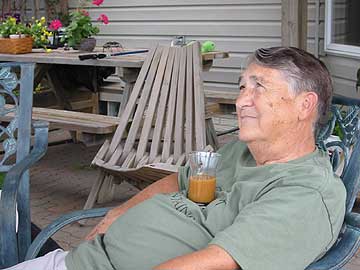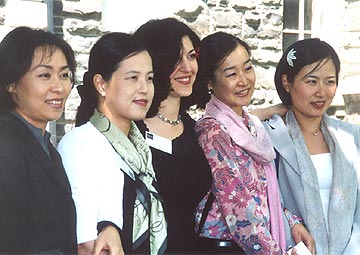Anyway, amidst all the raunchy jokes, some incredible truth emerged—not only about her life, but also about humanity. I’m quoting from memory here: “If you are a person of color, if you are gay, if you female, if you are a person of intelligence, if you are a person of integrity, you are a minority in this country.”
It made make think: It's true; racism and classism are alive and kickin’ in 2002 in the U.S. of A.
P.S. – Be sure to watch I’m The One That I Want, her first movie; it’s even better than Notorious.
Here’s the thought: There are places, both natural and man-made, that have more dignity than their inhabitants. In fact, although they are not living things, these places and buildings seem to be more human, to have more spirit and character than the homo sapiens who inhabit them.
To me, it’s sad when a building has more life than the people in it. I seem to be observing this all to often recently. Perhaps it’s because I keep interacting with people who have a hollow space inside them where substance, caring, the human spirit should be.
Or, Friday Was Better Than Monday. Or, When It Rains, It Pours.
Consider this scenario: You go to sleep at 11:59 PM one night, and things are as they have been for half a year. You go to sleep twenty-four hours later, knowing that you’re going to be a father, and knowing that the job you’ve been trying to get for the past year-and-a-half is now yours. Life is funny. Right now, life is also very good.
- On the flight in, the Dash-8 had about 12 people on it (a full flight by Ithaca standards), and we were graced by the presence of Cornell University President Hunter Rawlings, who is exactly like Spalding Gray. (Incidentally, my favorite regional aircraft is the Embraer 145.)
- The shuttle I took from LGA to Grand Central Terminal ran off the road and knocked down three trees and a light post shortly after leaving the airport. All forty of us exited the bus at that point, no one hurt fortunately, had amusing conversations in the light rain, boarded the next shuttle and were on our merry ways again in about a half hour. I was only fifteen minutes late to my first meeting.
- I had something called “Ipswitch Clam Panroast” ($13) for dinner at the Oyster Bar & Restaurant at Grand Central Terminal. This was perhaps the highlight of my day.
- The flight back to ITH was delayed 3 times, finally putting me back home around midnight. While annoying, this did give me the chance to have a nice drink with a friend from Cornell's Real Estate Program. Fortunately, I am married to a woman who is willing to pick me up late at the airport even when she isn’t feeling well.
 The harsh fiery altar of probability that is Las Vegas:
The harsh fiery altar of probability that is Las Vegas:
- Tuesday, at Caesar’s Palace: Gambled $10, won $35, up $25 for the day.
- Wednesday, at Treasure Island: Started with $25, gambled $20, won $60, up $65 for the week.
- Thursday: No gambling.
- Friday, at the Venetian: Started with $65, gambled $20, won $80, lost $60 doing more gambling, still up $65 for the week—held at par from Wednesday.
- Saturday, at the Luxor: Started with $65, gambled $30, won nothing, still up $35 for the week.
Sidenote: If you ever try to call gambling "gaming" in my presence, I'll smack you.
My parents had come to town for a visit and we were driving to breakfast. My dad was driving (an SUV, I should note) on a two-lane one-way road with parallel parking spaces on both sides. Being a Sunday morning in the city's Primary Breakfast Restaurant Zone ("PBRZ"), most of the spaces were occupied. My dad saw an available parking space, and nose-dived for it across the other lane of traffic, interestingly enough cutting off another SUV in the process. The other vehicle was in fact the same model as his.
Someone (possibly me) made a joke about aggressive SUV drivers (he he), which my dad heard. He laughed, not too enthusiastically, and proceeded to explain something:
"Jas, have you ever noticed that Baby Boomers are really fast and aggressive drivers?" Actually, I had always thought that it was just SUV drivers who were like this, but now that he mentioned it, yes, maybe I had noticed that.
He went on to explain that his generation grew up driving muscle cars, and as they got older, they never really lost their desire for fast driving and road power. Which explains why so many SUVs are owned by Baby Boomers. In their minds, they're still behind the wheel of a '67 Chevelle. Interesting, eh?
A couple of nights ago, Rose and I watched Roman Polanski's "Chinatown." Jack Nicholson was at the top of his form--in fact, one is reminded what a truly great actor he is (was?). All throughout this amazing film, I couldn't help but think of the pathetic "A Few Good Men," in which Nicholson also starred. It seems that he and Tom Cruise were cast in that film with the intention of conveying the message, "here's a great actor from yesterday (Nicholson), and a great actor from today (Cruise)." But putting Tom Cruise next to Nicholson on the screen is like putting White Zinfandel next to Grand Cru Bordeaux--a laughable contrast that only makes sense to the simplest of minds. A film like Chinatown (produced by a Hollywood studio, it should be noted) literally makes me want to cry when I think about the wretched debris being turned out by the mainstream studios today. But, as people are fond of telling me, they're just giving the public what they want. And to that I say: my disgust with mainstream American taste is not misplaced. So there.
Rose prepared artichokes, stuffed with meat and cooked in a tomato-garlic-etc. sauce that she whipped up (she can do that—just whip things up—and they taste good). It’s an old meal, a preparation that’s been around forever, one that she grew up with. It’s “peasant” food; it’s just the kind of meal that’s really good for your soul. Very tactile; eating those leaves you just can’t help but get your hands messy. It’s one of those meals that makes you laugh as you eat it…so good, an experience. Coupled with a great wine: formula for an incredible evening. I was lying in the middle of the floor laughing after dinner; it wasn’t from the alcohol.

For me, however, it causes problems. I absolutely find it mind boggling to separate one event or thing or person from another. When I analyze situations and try to problem-solve, I find it difficult to put outer boundaries on the domain of the problem. I want to keep connecting everything to everything--leading me to endlessly complex and insoluble situations.
I became better at putting edges on things during my four years of practicing architecture, and during my two years at business school. It's no surprise--both architecture and industrial-age business theories (which, yes, are still part of the contemporary MBA) have at their core a mechanistic view of the world, one that encourages piecemeal analysis.
I don't want to define edges. I don't want to have my problems neatly encapsulated. (Well, maybe I want to, but it seems against my nature to do so.) As a result, I'll continue to live with my scale problems--perhaps some day they'll actually come in handy.
Rose and I operate under certain principles that we constantly keep in the back of our minds. They condition what we do, and how we respond to things. Some of the principles are very serious, and some serve only to underscore the delightful absurdity of life. One example of the latter is something we call “A David Lynch Moment.”
Put simply, a Lynch Moment is any life occurrence that seems to be plucked directly from a David Lynch film. Here’s an example: Last Thanksgiving, Rose and I were driving home from Cornell to visit her parents—it was the beginning of the university’s fall break. We decided, as we often do, to take a non-interstate route once we entered Ohio. It would take us about twice the time to arrive at our destination, but we use any excuse we can to go on a roadtrip. (Interstate driving doesn’t qualify for roadtrippin’.)
On State Route 44, somewhere south of Painesville (aptly named), we came across a car stopped on the side of the road. Since it was Thanksgiving Day there wasn’t much traffic on that route, so we decided to stop and be helpful. We were a little wary—you know, you just don’t approach strange cars these days—but we did it anyway.
As I approached the car, an older woman got out, slowly. At first it seemed like she could barely walk. She was wearing one of those plastic medical identification bracelets they give you during a hospital stay. “Are you alright?” I asked.
She had a flat tire and it turns out she’d just been released from the hospital, having undergone heart surgery. “My son was supposed to come and get me today, but I guess he’s already gone to the house for dinner. So I decided to drive myself home.”
We let her use a cell phone to call her son, who arrived about ten minutes later as I was changing the tire. He looked twenty-five or so. “You guys can go,” he said. “Bein’ from New York and all you’re probably in a hurry.” Well, we were now.
So we went on, slightly more awake, slightly more aware of the world around us, hoping that this kid had it in him to escort his mother to Thanksgiving dinner.
Today, I was coming home after a busy morning of doing nothing, and I heard O.W.N. singing (at the top of her lungs and very off key, which is her true style), “DON’T CRY FOR ME ARGENTINA; THE TRUTH IS I NEVER LEFT YOU…”
There was no music accompanying her—the a cappella melody carried through the hallway like nails on a chalkboard. I just want to point out that Rose and I experience and observe mildly strange behavior from this person on a daily basis. I only feel inclined to report that which I find particularly interesting or disturbing. Thank you, this concludes the update.
a. The number of wine bottles opened and consumed is greater than the number of guests;
b. People stop caring whose glass they’re drinking from;
c. Every—yes, every—dish in your home’s inventory has been used;
d. Your bedroom vanity is being used as a bar;
e. You have “smoking” and “non-smoking” sections in the apartment;
f. Tears are shed when it’s time to go home.
Last night, we had a good party.
So, I have graduated. Well, actually it was a week ago—it’s taking me a while to reenter the reality that most of the non-academic world enjoys. I’m not quite there yet, and for the past week I’ve had trouble doing anything that requires the slightest amount of brainpower. Video games, movies, staring out the window—these are all very enjoyable things for me right now. I expect the reentry process to take about two months, but I should be mostly functional by early next week. Thank you for your concern.
In Cornell University’s commencement speech, Pres. Hunter Rawlings (who bears a striking resemblance to Spalding Gray) quoted a graduation charge given in the previous century by none other than Bob Hope: “I have some advice for all of you who are now planning to enter the real world—don’t.”
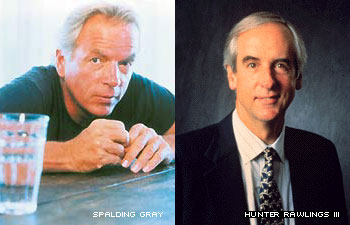
So that was a good start. The next thing I did was to pull out of the job offer I had accepted a week earlier, thus removing most of the sense of future security I had established up to that point. It was one of those situations where it was a big company and the money was good, but you just couldn’t wake up and feel good about what you did every day. Yes, during the first week after graduation things were shaping up to be quite exciting already.
Now, I move forward, revisiting the job contacts I’ve been neglecting since I accepted that offer. Shucks, now I have to work again—I didn’t want to do that. On top of it, hindsight reassures me of what I’ve been afraid to admit to myself for the past academic year: I picked the worst time in a long time to graduate with a master’s degree. Last year at this time, the economy was still fairly healthy in most parts of the country. By this time next year, the recovery will likely be well-established. Right now, though, graduates need to work their asses off—especially to achieve the combination of desirable position and salary levels we all think we deserve. Well, I suppose I should think of the situation this way: finding my ideal job in a mediocre economy will be a great, toughening experience.
This concludes the update for the 4 people who read this site every day. Wish Rose and me luck, and feel free to send a graduation gift to:
Jason R. Carroll
107 E. State St., Suite 307
Ithaca, NY 14850
Today I thought I'd do an entry about my Real Estate thesis project, which I just finished a week ago. It's a proposal for a mixed-use development for one of the last remaining parcels of developable land on Baltimore’s waterfront. The entire report is nearly 100 pages, so I won't link to it from here. What I will link is the executive summary of the report and the animated fly-through I created to sell the owner on the project.
Click here to view the Executive Summary.
(79K PDF - Acrobat Reader required)
Here's an excerpt from the report: Celebrating the city’s past, but with a decidedly forward-looking attitude, Canton Marine embodies the essence of everything that is wonderful about urban life in Baltimore: waterfront living, 24-hour recreation, a mix of fine retail and dining, and a place to work where you won’t mind staying late in the evening. In fact, bring the kids to the office—they’ll find plenty to do here.

Click to view fly-through animation.
(2.54 MB - Windows Media Player required)

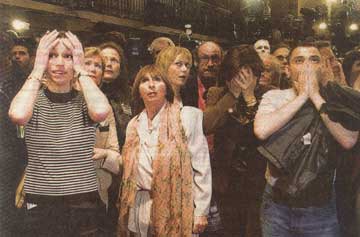
'I've been to a day-school, too,' said Alice; 'you needn't be so proud as all that.'
'With extras?' asked the Mock Turtle a little anxiously.
'Yes,' said Alice, 'we learned French and music.'
'And washing?' said the Mock Turtle.
'Certainly not!' said Alice indignantly.
'Ah! then yours wasn't a really good school,' said the Mock Turtle in a tone of great relief. 'Now at ours they had at the end of the bill, "French, music, and washing--extra."
'You couldn't have wanted it much,' said Alice; 'living at the bottom of the sea.'
'I couldn't afford to learn it.' said the Mock Turtle with a sigh. 'I only took the regular course.'
'What was that?' inquired Alice.
'Reeling and Writhing, of course, to begin with,' the Mock Turtle replied; 'and then the different branches of Arithmetic-- Ambition, Distraction, Uglification, and Derision.'
How do you stay in touch with your dreams?
When you’re bored with something, is it time to move on, or are you just lacking discipline?
If your work really is part of who you are, what do you do if it doesn’t make you happy any more?
Where is the line between being rigorous, and forcing yourself to do something you don’t like?
How much time should one spend in reflection?
What does an epiphany feel like?
 Apportez Votre Vin
Apportez Votre VinOh, my goodness, it’s amazing what a little get-a-way will do for the soul. Equally powerful is the difficulty in resuming daily ordinariness when one returns. Rosie and I spent the last four days “carrying our wine” to the fantastic little French restaurants at which we dined each night of our stay in Montreal (roll down to #4 in the article).
After a job interview on Wednesday, we drove north from NYC along the eastern edge of New York State, along route 87 through the Adirondacks. Gorgeous—it’s one of the most peaceful, billboard-lacking stretches of road I’ve ever seen. Of course, it’s not lacking in upstate NY strangeness, as Betty Beaver here attests.
 Pictured here is the interior of Notre Dame Cathedral, located in the lovely, although somewhat vacant, neighborhood called the Old City, from which the city grew. Also of interest is the near-1000-foot high “mountain” situated right in the middle of the city, just north of downtown. It’s for this, Mont Royale, that the city was named. The city has a great energy, dozens of great neighborhoods, and the friendly tension between Francophones and Anglophones makes things even more interesting. To the west of Rue St. Laurent (“The Main”), most people speak French, and to the east English has more of a stronghold. Unlike Paris, where you are made to feel guilty for not having perfected the language, simply start speaking English here and most of the bilingual locals will happily switch tongues.
Pictured here is the interior of Notre Dame Cathedral, located in the lovely, although somewhat vacant, neighborhood called the Old City, from which the city grew. Also of interest is the near-1000-foot high “mountain” situated right in the middle of the city, just north of downtown. It’s for this, Mont Royale, that the city was named. The city has a great energy, dozens of great neighborhoods, and the friendly tension between Francophones and Anglophones makes things even more interesting. To the west of Rue St. Laurent (“The Main”), most people speak French, and to the east English has more of a stronghold. Unlike Paris, where you are made to feel guilty for not having perfected the language, simply start speaking English here and most of the bilingual locals will happily switch tongues.
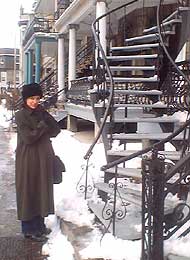 We stayed at a B&B on Rue St. Hubert called Le Traversin. It’s run by two wonderful guys, Sylvain and Jean, who seem to understand exactly what people are looking for when they’re on vacation. The house is beautiful—each room is a different color, and the amenities are fantastic. Everything is in balance. It’s in a great neighborhood, with spiral staircases reaching down from second-story flats to embrace the street, and little restaurants around every corner.
We stayed at a B&B on Rue St. Hubert called Le Traversin. It’s run by two wonderful guys, Sylvain and Jean, who seem to understand exactly what people are looking for when they’re on vacation. The house is beautiful—each room is a different color, and the amenities are fantastic. Everything is in balance. It’s in a great neighborhood, with spiral staircases reaching down from second-story flats to embrace the street, and little restaurants around every corner.
 It seems like rural and suburban Quebec are much like the U.S., just in French. The built environment appears very similar, with similar patterns of growth and sprawl…and yes (unfortunately), all the old familiar faces. We found this PFK in a strip shopping center near the border between Quebec and Ontario. Like everything else, to the nasal American ear, sprawl is a bit more palatable in French. Yeesh.
It seems like rural and suburban Quebec are much like the U.S., just in French. The built environment appears very similar, with similar patterns of growth and sprawl…and yes (unfortunately), all the old familiar faces. We found this PFK in a strip shopping center near the border between Quebec and Ontario. Like everything else, to the nasal American ear, sprawl is a bit more palatable in French. Yeesh.
Sigh…back to work. Send me an email if you want some restaurant suggestions when you visit.
—from Italo Calvino, Invisible Cities, 1972.

What will life be like then? None of us have known any other world.
Here’s my question: Doesn’t that fact that we (collectively) are even having a national discussion about affordable housing imply that we believe there are systemic problems in the American capitalist-democratic system that can never be cured? In other words, if laissez-faire capitalism works, then the invisible hand of the market would allocate scarce resources efficiently and all types of housing needs would be met, including affordable housing (because there is a demand for affordable housing). However, this does not happen. Therefore policy, a “band-aid,” becomes necessary to modify the natural behavior of the market.
In short, my assertion is that the mere existence of policy (of any sort) supports the notion that an unrestrained market doesn’t really allocate resources efficiently, or equitably.
Increasingly, U.S. multinational corporations are turning overseas for cheaper labor. This behavior has been reinforced by various U.S. trade policies. Cheaper labor enables U.S. companies to sell goods at prices below what would be achievable with U.S. labor. If companies were restricted from using foreign labor, prices of certain goods would rise beyond the point where consumers perceive value in those goods—i.e., a consumer may not purchase a pair of Nike shoes if the price was $300. In other words, being dependent on/accountable to our own labor and resource supplies could help reduce our proportion of global consumption by increasing prices of the many luxury goods that we Americans now incorrectly view as necessities.
An “isolationist” labor policy, if it increased the prices of U.S. consumer goods, would also have negative short-run economic impacts (inflation, possible recession, increase in unemployment). However, in the medium-run, the Fed and the government could use an appropriate mix of fiscal and monetary policy to bring the U.S. economy back into a state of lower inflation and reasonable growth (this policy mix would necessarily be too complicated to discuss in these short paragraphs). The government could also enact policies that encourage economic growth via services rather than consumer goods, since services do not have nearly as large an environmental impact as goods.
Whaddaya think?
For me, it takes about two years to get acquainted with a place, to establish strong relationships and a good group of friends. Now that this is finally starting to happen in Ithaca, it’s time to leave! Those are the types of fun tricks life likes to play on you, I suppose.
The other frustrating part is—how do I choose my final courses? Certain ones—the ones I know I need—are easy. But there’s so much good stuff here that it hurts when you must choose to not take a class. It’s a giant smorgasbord, and you can’t eat it all—unfortunately. I’ve taken so many finance courses that I feel one more won’t add any additional value. So, I think I’ll round out the experience by stepping back and fitting everything I’ve learned into the big picture. Let’s try some macroeconomic theory, a bit of urban land use planning and some intense discussion of affordable housing and sustainable development. I can’t leave without having some fun, though. So perhaps I’ll keep making photographs this semester (pure joy), and take the Hotel School’s wine-tasting course. Who can think of anything better than a university course in wines?
Today I am thinking about how thankful I am for family and good friends. This sounds like a cliché, but really it’s an axiom: When you are surrounded by people who love you, the pain of life’s difficulties is diminished, and the joy of life is magnified one hundredfold.
After spending wonderful time with both of our families this holiday, Rose and I have now come to rest for a few days at our friend Suzi’s house on beautiful, gray, endless Lake Eire. Suzi is the kind of friend who gives even when she doesn’t have. There’s one word to describe her: unconditional. When you have people in your life who love and care for you unconditionally, you are truly fortunate.
We celebrated the new year last night at a restaurant in Tremont, the gentrified old steelworker’s neighborhood just south of downtown Cleveland. The restaurant, Sage Bistro, was created by Rose’s cousin Marisa, her husband Nick, and their friends Michael and Linda. The place did smashingly well last night—a fully packed house! We’re so happy for them. And of course our dear friend Bill surprised us by showing up just after midnight, placing his ice-cold hands on Rose’s neck to announce his arrival.
I think of all of my new Korean and Chinese friends whom I’ve met a Cornell. How much I’ve learned about their cultures! And what hospitality Rose and I have experienced from them! They are all so kind, genuine and gracious. (There seem to be so few people in the world who are truly gracious.) I take comfort and pride in the fact that I know that I will be friends with them for the rest of my life. I look forward to visiting them in their home countries.
There are many others I could mention that are just as important to Rose and me. The people here are simply the ones currently in my consciousness. I’m so thankful, and so happy. I pray that this feeling is a sign of things to come this year.
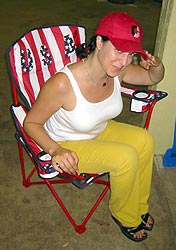 Rose: simultaneously showing her undying patriotism and expressing the irony of sitting on a flag that has been fashioned into a patio-chair with beer-cozies.
Rose: simultaneously showing her undying patriotism and expressing the irony of sitting on a flag that has been fashioned into a patio-chair with beer-cozies.
